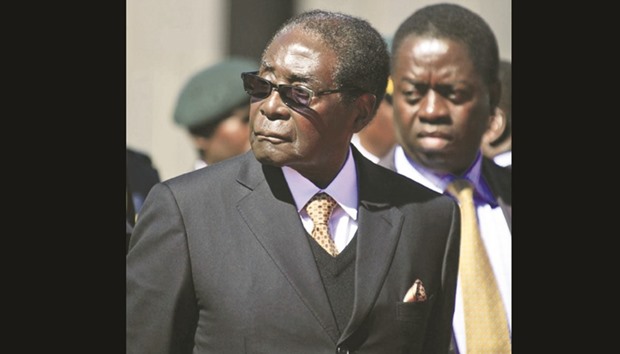Zimbabwe’s government has agreed to pay outstanding cash bonuses, bringing an end to a brief sit-in protest by public workers, union leaders and a government minister said.
“The issue that we were clamouring for, which is the cash payment of bonuses, has been accepted,” said Raymond Majongwe, secretary general of Progressive Teachers Union of Zimbabwe.
“Payments for our bonuses in cash will be starting in April, so we have called off the strike,” Richard Gundeni from the Zimbabwe Teachers Association told DPA.
Doctors called off a three-week strike on Sunday after the government approved increased allowances and created 250 new jobs, the same day President Robert Mugabe returned from medical leave in Singapore.
Civil service unions said the 2016 bonuses would be staggered, starting with the army, doctors and nurses being paid in April, police in May and teachers in June.
Prisca Mupfumira, the public service and labour minister, confirmed the bonus agreement with the unions.
Finance Minister Patrick Chinamasa has previously said the government requires $180mn for bonuses.
The southern African nation had failed to pay civil servants their bonuses due to a lack of funds.
An offer to substitute the bonus with land was rejected by unions.
Reuters earlier saw signs that the sit-in was not being adhered to everywhere.
At the government registry in the capital Harare, officials were issuing passports and birth certificates as normal, while teachers taught lessons at schools in the city centre.
Some teachers said they had not joined the strike after it started today to give negotiations a chance.
Unions said 90% of rural teachers participated in the strike.
Union officials were not available to comment on how many other civil servants heeded the strike call.
Last July government operations were brought to a halt after a public sector strike coincided with a stay at home rallying call by social media groups.
Meanwhile, medical union representatives said the government had partially met their demands for better pay and working conditions.
They said doctors also returned to work because they were concerned about high mortality levels at hospitals during the strike.
Hospitals in Zimbabwe have been at a standstill since the middle of February with admissions suspended, many wards cleared of patients and non-critical casualty cases turned away after nurses joined the action.
State hospitals cater to the majority of Zimbabweans who cannot afford private hospitals.
The country had one of Africa’s best healthcare systems, but many health professionals have left during the country’s economic crisis over the last 15 years.
“We have resumed our duties. All the doctors are back at work,” Edgar Munatsi, president of the Hospital Doctors Association, told AFP. “We came to the decision on compassionate grounds after our meeting with the government failed to address our grievances.
“We were moved by the plight of the suffering patients. The mortality rate in the hospitals was going up and it appeared the government was not concerned,” he added.
No mortality figures were available from the government or the doctors’ union.
The strike centred on demands for higher allowances and job guarantees for junior doctors.
The state-owned Herald newspaper said some allowances had been increased for medical staff.
An AFP correspondent in Harare observed last week that most wards at Parirenyatwa, Zimbabwe’s main state hospital, were empty.
At the Mpilo hospital in the second city of Bulawayo, a small number of senior doctors attended to patients.
Zimbabwe’s economy shrank by an estimated 0.3% last year and will contract by 2.5% in 2017, according to the International Monetary Fund (IMF).
The southern African country is still struggling to recover from the 1999-2008 recession, sparked partly by the expropriation of experienced white farmers, which cut the economy by half and forced the government to replace the inflated currency with the US dollar in 2009.
More than 80% of the workforce scrape a living in the informal sector, a situation that deprives the government of tax income.
Mugabe, 83, has faced increasing protests about the state of the economy.
Last year, his security forces quelled a series of street protests in Harare against his regime and the country’s dire economic plight.

Mugabe, who returned from medical leave in Singapore on Sunday, used his security forces to quell street protests last year.
